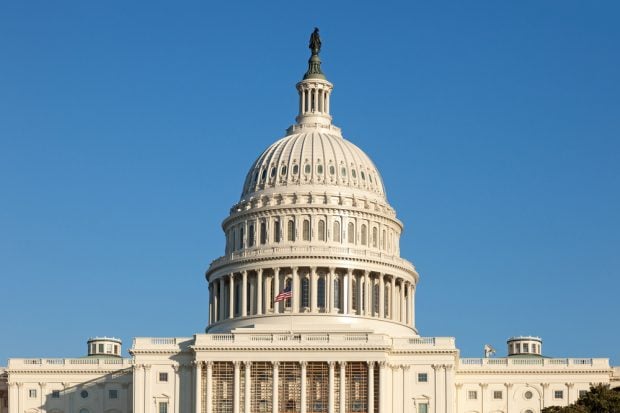 U.S. Capitol building. (Source: Shutterstock)
U.S. Capitol building. (Source: Shutterstock)
House and Senate conferees on the massive defense authorization bill have rejected a proposal to allow banks to have the same free rent benefits that credit unions now receive on military installations.
The provision is a small part of the 4,517-page annual defense bill, but it comes up each year and always pits credit union and banking trade groups against each other.
Recommended For You
The bill also includes money laundering provisions that bank and credit union trade groups have sought.
However, President Trump has signaled he may veto the measure over a technology provision or a plan that would rename military installations that currently are named after Confederacy soldiers.
But the defense bill is considered must-pass legislation and the House and Senate might have the votes to override the veto.
The bill, as passed by the Senate, called for banks to receive the rent benefit, but the House bill did not contain that provision. As in past years, the Senate agreed to the House plan.
Credit union trade groups said they were pleased with the decision.
"Our members work very hard to provide quality products and services to our military," Tony Hernandez, president/CEO of the Defense Credit Union Council said. He noted that the DCUC, CUNA, NAFCU and state credit union leagues all worked to defeat the Senate proposal.
"Credit unions have[a] long legacy of service to the military and its military families, which is why they were granted the opportunity for such arrangements in a 2006 amendment to the Federal Credit Union Act," CUNA President/CEO Jim Nussle said, after the agreement was reached.
"We thank lawmakers on the NDAA conference committee for recognizing the key differences between credit unions and banks and removing the bank-sought provision that would have treated banks the same as not-for-profit credit unions," NAFCU President/CEO B. Dan Berger said.
But Steven Lepper, president/CEO of the Association of Military Banks of America, accused the credit union trade groups of unfairly characterizing the current situation.
"Because the credit union trade associations falsely suggested that DoD, without legislation, could easily grant banks the same rent-free benefit credit unions extracted from Congress over a decade ago, more banks will leave the bases they have served for many years," he said. "The ultimate victims are the military families that need our banks' support the most, especially during these difficult financial times."
The defense bill also includes anti-money laundering provisions, including the requirement that businesses disclose their actual owners when they are formed. Members of Congress hailed the anti-money laundering plan as long overdue.
"Updating and strengthening our money laundering and corporate transparency laws and insisting on tighter enforcement will finally provide for a 21st-century system to combat money laundering-related financial crimes, estimated by Treasury to generate about $300 billion per year in illicit proceeds," said Senate Banking Committee ranking Democrat Sherrod Brown of Ohio.
"It is the first serious overhaul of our anti-money laundering system in decades, and it makes sense to include it in the biggest, most important national defense legislation Congress passes each year," Sen. Mike Rounds (R-S.D.) said.
And on the House side, Financial Services Chairwoman Maxine Waters said, "I and the Members of my Committee worked hard to ensure that the National Defense Authorization Act includes measures that will help law enforcement prevent these criminals from using shell companies to hide their activities and will close loopholes and increase penalties on those bad actors who are using our system for activities that threaten the U.S. and our allies."
© Touchpoint Markets, All Rights Reserved. Request academic re-use from www.copyright.com. All other uses, submit a request to [email protected]. For more inforrmation visit Asset & Logo Licensing.






